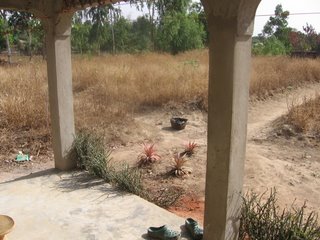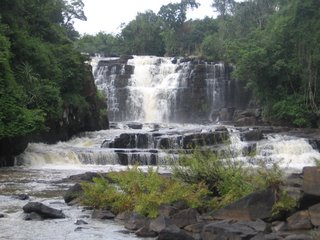Monday, December 25, 2006
Tuesday, December 19, 2006
Village Health Forum
We had a health forum in my village to promote the water disinfectant product "Sur Eau," HIV/AIDS prevention, and the moringa tree (used for nutritional benefits and herbal healing). The forum included a girls soccer game, HIV/AIDS video screening, skit night, dance, and health information sessions. I also got to paint a mural to promote the three health themes of the forum. Six fellow volunteers came out in support and it was a great time!

Girls' soccer teams

Peace Corps volunteers at the soccer game

Sur Eau, Nebeday (Moringa), and AIDS mural

Reading an AIDS brochure

Girls' soccer teams

Peace Corps volunteers at the soccer game

Sur Eau, Nebeday (Moringa), and AIDS mural

Reading an AIDS brochure
Health Minister's Visit
The health minister came to my village, which is a very big deal. The local officials gave speeches about health needs in the area and the health ministry's plan for the coming year.

Kids with drum to announce the arrival
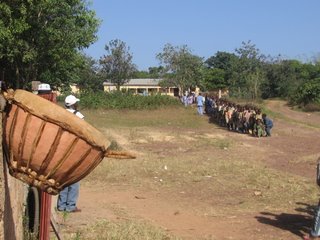
Drum and school children lining up for the event

The health minister arrives
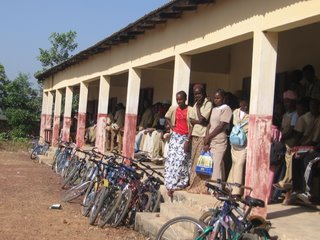
Bikes and students at the middle school

Guinea pride

Primary school girls get a view

Kids with drum to announce the arrival

Drum and school children lining up for the event

The health minister arrives

Bikes and students at the middle school

Guinea pride

Primary school girls get a view
Fruit Tree Grafting Training
Tuesday, October 31, 2006
Potato Festival

Volunteers in Mali-ville for the potato festival

The Dame de Mali

On top of Mt. Loura in Mali-ville
A big group of volunteers travelled north to Mali-ville for the annual potato festival. Though I didn't see any potatoes, we had a good time. The opening ceremony for potato season was held at the highest point in the Fouta, Mt. Loura. One of the volunteers fell and cut open her knee on the hike up, so a few us us went back down to town to treat it. Luckily, we got to go up to Mt. Loura the next morning and the clouds had cleared for a beautiful view!
Saturday, August 19, 2006
Moringa Planting
I am currently encouraging people in my district to plant Moringa trees in their compounds and fields. After a cow ate our tree nursery for reforestation this May, my village co-worker, Ibrahima, and I replanted with Moringa. This tree can be found in neighboring Senegal and the Gambia, where they use the leaves to make leaf sauce (usually served with rice). The leaves can be dried and pounded into a powder, which is then added to any sauce to increase the meal's nutritional benefits. The flowers and pods of the tree are also edible. Moringa boasts many medicinal benefits; a tea made from the leaves can be used to treat diabetes and hypertension. We are currently distributing the young saplings among members of our nearby districts and planting them in school courtyards. The real work is just beginning as we embark on an education campaign to acquaint the community with the tree's benefits and uses. Hopefully by the end of my service some members will have incorporated it into their diets!



My co-worker, Ibrahima, and his family plant a Moringa tree in their compound in Kollanghi



My co-worker, Ibrahima, and his family plant a Moringa tree in their compound in Kollanghi
Bike Trip to Koyin
Molly, Melanie, and I biked out east 9 hours from Labe to our friend Ryan's village in order to support his Family Planning Festival. The event included foot races, bike races, and a game show about family planning with prizes.

Melanie on the hill into Koyin

Molly after taking a spill

Melanie and Molly

Melanie on the hill into Koyin

Molly after taking a spill

Melanie and Molly
Chutes de Sala
Friday, July 07, 2006
4th of July
A group of us went down to a friend's village in the hills, northeast of Mamou. We sang the National Anthem and played American football and soccer in the rain. We had a great time celebrating our American holiday as a group of 11. We hiked up the mountain overlooking the site, but didn't spot any chimps. One night we killed and prepared 2 chickens for dinner.

Singing the National Anthem for the 4th
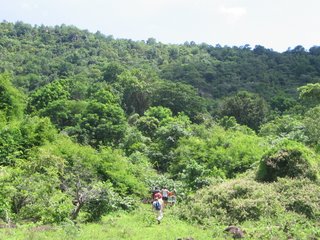
Hiking up the mountain
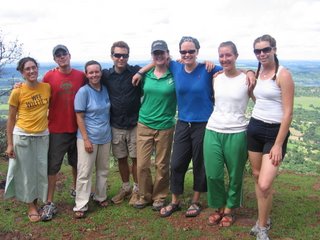
Hiking group

The view down to Kouru

Out on a rock

Joel and Reid preparing chickens for dinner

Singing the National Anthem for the 4th

Hiking up the mountain

Hiking group

The view down to Kouru

Out on a rock

Joel and Reid preparing chickens for dinner
What do you do for work?
The rainy season (July-October) is a very busy time for agroforestry. We are outplanting trees for reforestation and for individual concessions. My village is currently planting native trees, Lengue, that have a valuable wood for carpentry. We are planting them near a water source to decrease erosion and protect the area. We are also direct seeding cashew for reforestation. A group of farmers is interested in starting coffee, so we’re preparing a seed germination bed and I’m tracking down seeds from an agricultural research center in the next big town away. My main project is planting moringa trees in individual concessions. The moringa tree is referred to as “the miracle tree” for its high nutritional content, medicinal uses, quick growth rate, use as animal fodder, and enrichment of the soil (nitrogen-fixing). I have approximately 2,000 trees going in my village and the next village over, and we’re working on outplanting them in concessions and educating people as to its benefits. You can prepare the leaves fresh, as in their leaf sauce they serve with rice, or dry them and pound them and use them as a nutritional additive to any dish. Tradition is held in high esteem here and a change from the norm is very difficult. People are already excited about the tree and expressing interest, so I am excited about its prospects here.
I attended a Pular book-keeping training for the farming co-ops in my district, where I introduced moringa to the co-ops and introduced myself as a local resource for technical information. By the end of the day I was frantically copying out local natural pesticide recipes for termites in Pular and handing out moringa trees to outplant throughout the district. Though work is slow-going, there are some days like that one where everything just comes together.
I’m also working with the village on secondary, non-agroforestry projects. They are interested in starting a community library, so we’re going to do a small test-run to gauge interest. The village currently lacks a youth center (Maison de la Jeunesse), found in many other places. They are hoping to start building one soon, and I am looking into outside donor options for audio and electronic equipment (for youth gatherings). Ideally the youth center could house a community library. They have also expressed interest in fencing off the village soccer field, to decrease maintenance costs.
I attended a Pular book-keeping training for the farming co-ops in my district, where I introduced moringa to the co-ops and introduced myself as a local resource for technical information. By the end of the day I was frantically copying out local natural pesticide recipes for termites in Pular and handing out moringa trees to outplant throughout the district. Though work is slow-going, there are some days like that one where everything just comes together.
I’m also working with the village on secondary, non-agroforestry projects. They are interested in starting a community library, so we’re going to do a small test-run to gauge interest. The village currently lacks a youth center (Maison de la Jeunesse), found in many other places. They are hoping to start building one soon, and I am looking into outside donor options for audio and electronic equipment (for youth gatherings). Ideally the youth center could house a community library. They have also expressed interest in fencing off the village soccer field, to decrease maintenance costs.
Friday, June 30, 2006
Friends Visit
In June I was fortunate to welcome three visitors from the States to my village. My friend from home, Anna, came with two of her friends from college. We had a great time, despite their visit coinciding with the strikes and riots. It was so interesting to rediscover Guinea again through their fresh impressions.

Lizzie and Jenny (holding Emerson) on my front porch with village girls
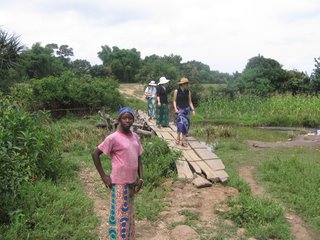
Binta leads us to her home the next village over

Anna teaches Binta Jacob's Ladder

Anna and me harvesting peanuts with Binta's family

Local bricks used for building homes

The village brick quarry

Lizzie and Jenny (holding Emerson) on my front porch with village girls

Binta leads us to her home the next village over

Anna teaches Binta Jacob's Ladder

Anna and me harvesting peanuts with Binta's family

Local bricks used for building homes

The village brick quarry
Strike and Riots
Here in Guinea the rainy season is underway. My village went from brown to green seemingly overnight; once dusty paths are now tall rows of corn.
The change in seasons has escalated along with changing attitudes amongst the Guinean people. Gas prices have risen to the point where a government worker's entire monthly salary can not purchase a sack of rice to feed his family. The price of gas increased from 4300 Guinean Francs/liter to 5500 GF/L overnight without warning from the government.
Guineans reacted with a national general strike: no taxis, markets, boutiques, schools, or commerce. The teachers in major cities boycotted the national Bac exam on Monday, June 12th, resulting in student riots that led to at least 5 student deaths in Labe and 10 in Conakry.
The Peace Corps took the appropriate safety precautions, and at no point did I feel unsafe. We watched the Labe skyline from the 2nd floor terrace of the hotel outside of town where Peace Corps volunteers stay. What started as cap gun fire progressed to live ammunition. Plumes of smoke rose above downtown as students burned tires in the streets. The military proceeded to walk through the quartiers of the city, firing live rounds into the air of intersections to enforce a street ban. A Peace Corps guard's wife was sleeping in her bed when a bullet went through her roof and into her bed frame. Luckily, she was uninjured.
While we were sitting on the terrace, three military men walked by and shot a round in the air at the intersection in front of the hotel. A man walked by from their direction carrying two large mangoes. He looked up at our terrace and said in English with a smile "Don't be afraid" and continued on his way home. As the riots downtown turned violent, we watched women in neighboring concessions continue their laundry. It was all very surreal.
The government and union leaders have finished negotiations and life is back to normal for the moment here in Guinea. In my village the only way you would know unrest was going on in the big cities was our lack of bread (usually trucked in from two nearby towns). I had three visitors from America with me for the last few weeks, and they definitely got an interesting view of life here.
Tomorrow morning I head back up-country to my village, where I'm out-planting moringa trees. Moringa trees' leaves have a very high nutritional content, so I am encouraging local women to use the leaves in the leaf sauce they serve with rice. We are also working on planting coffee and cashew.
The change in seasons has escalated along with changing attitudes amongst the Guinean people. Gas prices have risen to the point where a government worker's entire monthly salary can not purchase a sack of rice to feed his family. The price of gas increased from 4300 Guinean Francs/liter to 5500 GF/L overnight without warning from the government.
Guineans reacted with a national general strike: no taxis, markets, boutiques, schools, or commerce. The teachers in major cities boycotted the national Bac exam on Monday, June 12th, resulting in student riots that led to at least 5 student deaths in Labe and 10 in Conakry.
The Peace Corps took the appropriate safety precautions, and at no point did I feel unsafe. We watched the Labe skyline from the 2nd floor terrace of the hotel outside of town where Peace Corps volunteers stay. What started as cap gun fire progressed to live ammunition. Plumes of smoke rose above downtown as students burned tires in the streets. The military proceeded to walk through the quartiers of the city, firing live rounds into the air of intersections to enforce a street ban. A Peace Corps guard's wife was sleeping in her bed when a bullet went through her roof and into her bed frame. Luckily, she was uninjured.
While we were sitting on the terrace, three military men walked by and shot a round in the air at the intersection in front of the hotel. A man walked by from their direction carrying two large mangoes. He looked up at our terrace and said in English with a smile "Don't be afraid" and continued on his way home. As the riots downtown turned violent, we watched women in neighboring concessions continue their laundry. It was all very surreal.
The government and union leaders have finished negotiations and life is back to normal for the moment here in Guinea. In my village the only way you would know unrest was going on in the big cities was our lack of bread (usually trucked in from two nearby towns). I had three visitors from America with me for the last few weeks, and they definitely got an interesting view of life here.
Tomorrow morning I head back up-country to my village, where I'm out-planting moringa trees. Moringa trees' leaves have a very high nutritional content, so I am encouraging local women to use the leaves in the leaf sauce they serve with rice. We are also working on planting coffee and cashew.
Fish Fete
I met up with Marie, a volunteer friend from the Basse Cote (western coastal region), and traveled out east to Haute Guinea. We met our friend Amanda in her small village, Selouma. It was a great mini-reunion. We went on a walk beneath the mountain overlooking her village (with chimps on it!) and slept in her hut, before continuing on to the regional capital of Haute, Kankan.

Marie and Amanda in Selouma
I expected Kankan to be hot, dusty, and dry, but it was quite green, the streets lined with trees. We enjoyed catching up with volunteers out in that region that we don'’t get to see that often. We visited local craftsmen and I bought wood and cowbone necklaces and passport masks from the forest region. The ebony wood craftsman let Marie try working some ebony.

Marie working ebony in Kankan
We taxied out for the weekend for the fish fete, an annual celebration in many villages off the Niger River. The festival celebrates the start of fishing season for the ponds formed in the floodplain of the Niger. They celebrate fish fete right before the rainy season washes the Niger back into the floodplain, emptying the ponds of their fish. Drummers and dancers come for the celebration.
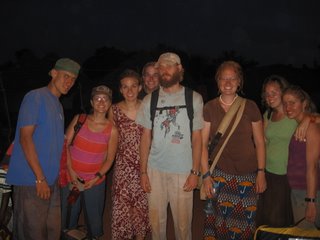
Dusty after the taxi ride

Sharing a bowl of rice and sauce
We went to a small village named Nounkounkan. There was a huge opening ceremony where all of the performance groups in attendance did a short introduction. There were dancers, singers, traditional instruments, skits, and drummers. They even made the Peace Corps do a performance, so we disco-walked out in the circle and did the macarena with an AIDS prevention chant. Embarrassing, but hilarious. Each evening had small circles of drumming and dancing throughout the small village. We got stuck in a downpour and took shelter with a group of musicians playing the kora, a traditional instrument, and danced until the rain stopped.
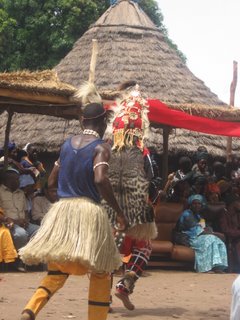



After a few days of dancing and drumming, Sunday morning the village made the call to fish. Everyone streamed down the path to the fish pond, carrying fishing implements. People rushed the water all at once and fishing began. It was a madhouse, the water packed full with people. I walked the perimeter of the lake and a man threw me a big fish from the water. From then on everyone there thought I had caught a fish and were quite impressed. A group of sword dancers singing and shaking their swords in single file around the lake changed their song to "the white girl caught a fish"” in Malinke.
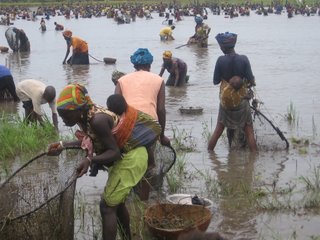
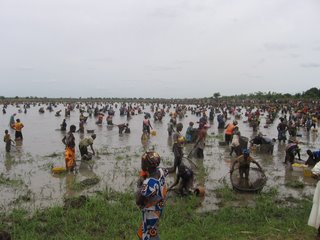
After the fish fete ended, a few of us continued on to a neighboring village, Niandankoro. We swam and did laundry in the lazy Niger and slept in our friend's hut. Her homestay family served us the main dish, To, made of pounded manioc, spongy and slimy in consistency. They serve it with a salty green sauce. Her homestay mom gave birth to her 13th baby that night!

Walking to Melinda's hut in Niandankoro

The Niger River

Colin carrying laundry back to the hut

Marie and Amanda in Selouma
I expected Kankan to be hot, dusty, and dry, but it was quite green, the streets lined with trees. We enjoyed catching up with volunteers out in that region that we don'’t get to see that often. We visited local craftsmen and I bought wood and cowbone necklaces and passport masks from the forest region. The ebony wood craftsman let Marie try working some ebony.

Marie working ebony in Kankan
We taxied out for the weekend for the fish fete, an annual celebration in many villages off the Niger River. The festival celebrates the start of fishing season for the ponds formed in the floodplain of the Niger. They celebrate fish fete right before the rainy season washes the Niger back into the floodplain, emptying the ponds of their fish. Drummers and dancers come for the celebration.

Dusty after the taxi ride

Sharing a bowl of rice and sauce
We went to a small village named Nounkounkan. There was a huge opening ceremony where all of the performance groups in attendance did a short introduction. There were dancers, singers, traditional instruments, skits, and drummers. They even made the Peace Corps do a performance, so we disco-walked out in the circle and did the macarena with an AIDS prevention chant. Embarrassing, but hilarious. Each evening had small circles of drumming and dancing throughout the small village. We got stuck in a downpour and took shelter with a group of musicians playing the kora, a traditional instrument, and danced until the rain stopped.




After a few days of dancing and drumming, Sunday morning the village made the call to fish. Everyone streamed down the path to the fish pond, carrying fishing implements. People rushed the water all at once and fishing began. It was a madhouse, the water packed full with people. I walked the perimeter of the lake and a man threw me a big fish from the water. From then on everyone there thought I had caught a fish and were quite impressed. A group of sword dancers singing and shaking their swords in single file around the lake changed their song to "the white girl caught a fish"” in Malinke.


After the fish fete ended, a few of us continued on to a neighboring village, Niandankoro. We swam and did laundry in the lazy Niger and slept in our friend's hut. Her homestay family served us the main dish, To, made of pounded manioc, spongy and slimy in consistency. They serve it with a salty green sauce. Her homestay mom gave birth to her 13th baby that night!

Walking to Melinda's hut in Niandankoro

The Niger River

Colin carrying laundry back to the hut
Subscribe to:
Comments (Atom)



 Musee D'Orsay
Musee D'Orsay








